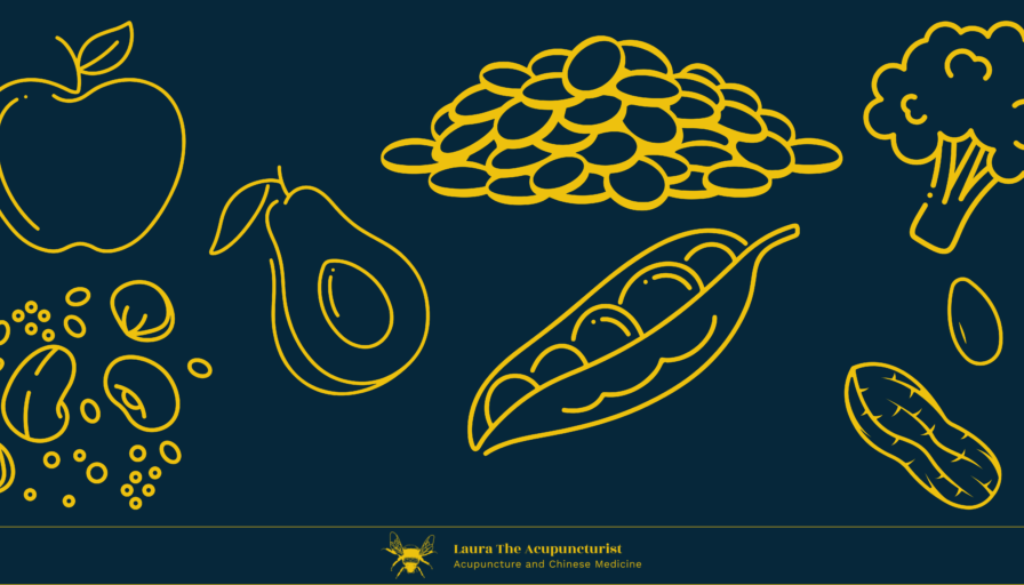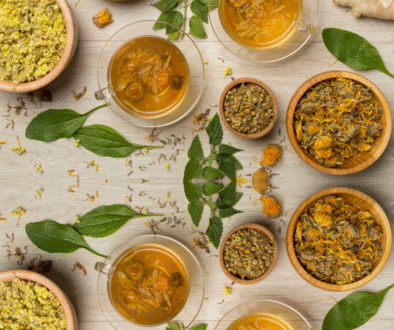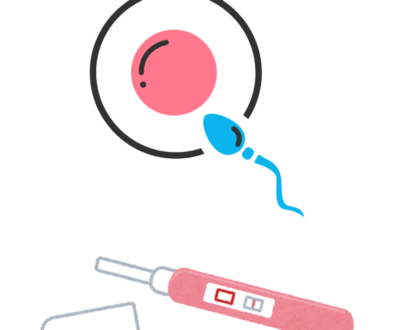TCM Food Guide
A Guide to Foods for Different TCM Diagnoses
Traditional Chinese Medicine (TCM) is all about balance—balancing your Qi (energy), Yin and Yang, and the different organ systems. Food is an essential part of achieving this balance, as it carries a significant power to heal and harmonise the body. In TCM, foods are used much like herbs: they nourish, energise, warm, cool, or detoxify depending on your body’s needs. Let’s explore some of the most common TCM diagnoses and which foods work best to restore balance in each case.
1. Spleen Qi Deficiency
Spleen Qi deficiency is one of the most common diagnoses in TCM and is often associated with fatigue, bloating, poor digestion, loose stools, and a general feeling of heaviness. The Spleen is central to digestion and transformation in TCM, and when it becomes weak, the body struggles to properly digest food and absorb nutrients.
Recommended Foods:
Cooked Whole Grains: Oats, quinoa, millet, and rice are easy to digest and strengthen the Spleen.
Root Vegetables: Sweet potatoes, carrots, parsnips, and squash help to stabilise and energise the digestive system.
Warming Spices: Ginger, cinnamon, and turmeric gently warm the body and improve digestion.
Soups and Stews: Lightly cooked, easy-to-digest dishes like vegetable soups or congee are ideal, as they reduce strain on the digestive system.
Foods to Avoid:
Cold, raw foods (like salads), excessive sugar, and dairy—all of which can impair the function of the Spleen.
2. Kidney Yin Deficiency
Kidney Yin deficiency is often characterised by symptoms such as night sweats, lower back pain, anxiety, and hot flashes. Yin represents the cooling, moistening, and restorative energy of the body, and when it is deficient, heat symptoms and dryness can appear.
Recommended Foods:
Cooling Fruits: Pears, watermelon, apples, and blueberries are hydrating and help restore Yin.
Nourishing Proteins: Duck, eggs, and fish, which are cooling and help build Kidney Yin.
Yin-Nourishing Grains: Barley, millet, and black beans help replenish Yin.
Dark Leafy Greens: Spinach, kale, and bok choy, which help restore balance and add moisture.
Foods to Avoid:
Hot, spicy foods, alcohol, caffeine, and red meats—which can all exacerbate Yin deficiency symptoms.
3. Liver Qi Stagnation
Liver Qi stagnation is a common diagnosis, often resulting from stress or emotional turmoil. Symptoms include irritability, headaches, menstrual irregularities, and tightness in the chest. The Liver is crucial in ensuring the smooth flow of Qi, and stagnation can cause both physical and emotional tension.
Recommended Foods:
Green Vegetables: Broccoli, cabbage, celery, and spinach, which help to move stagnant Liver Qi.
Citrus Fruits: Lemons, limes, and oranges aid in the movement of Qi and gently detoxify the body.
Herbs and Spices: Peppermint, turmeric, and basil help to relax and regulate the Liver.
Light Proteins: Fish and legumes, which are easier to digest and don’t exacerbate stagnation.
Foods to Avoid:
Greasy, fried foods, excessive dairy, and sugar—which can further stagnate Liver Qi.
4. Blood Deficiency
Blood deficiency in TCM refers to a lack of nourishment and vitality, leading to symptoms like dizziness, palpitations, dry skin, insomnia, and a pale complexion. This condition is often compared to anemia in Western medicine, and is most common in women, especially after childbirth or during heavy periods.
Recommended Foods:
Red and Dark-Coloured Foods: Beets, goji berries, cherries, and red dates all help to nourish the blood.
Iron-Rich Proteins: Chicken, liver, beef, and eggs, which provide vital nutrients for building blood.
Leafy Greens: Kale, Swiss chard, and collard greens, which contain important vitamins and minerals.
Nuts and Seeds: Black sesame seeds and walnuts are especially beneficial for building Blood.
Foods to Avoid:
Cold foods, excessive caffeine, and raw vegetables, which can weaken digestion and inhibit nutrient absorption.
5. Dampness Accumulation
Dampness can manifest as bloating, a heavy sensation in the body, foggy thinking, and excess mucus production. It is often caused by poor digestion or a diet high in damp-inducing foods like dairy or fried items.
Recommended Foods:
Diuretic Vegetables: Celery, cucumber, asparagus, and radishes help expel excess dampness.
Whole Grains: Barley, millet, and brown rice—which are drying and help remove Dampness.
Warming Spices: Ginger and turmeric help to disperse Dampness and promote digestion.
Bitter Foods: Dandelion greens, bitter melon, and rocket help dry Damp and cleanse the system.
Foods to Avoid:
Dairy, fried foods, excessive sweets, and cold drinks—which can all contribute to Dampness.
6. Yang Deficiency
Yang deficiency is characterised by a lack of warmth and energy in the body, often leading to symptoms such as cold hands and feet, fatigue, water retention, and a general sense of feeling cold. Yang represents the warming and active energy of the body, and when it is deficient, the body’s ability to generate heat and maintain energy is compromised.
Recommended Foods:
Warming Proteins: Lamb, chicken, and venison, which help to generate warmth and support Yang energy.
Root Vegetables: Onions, garlic, and leeks, which have warming properties that help stimulate Yang.
Warming Spices: Cinnamon, ginger, nutmeg, and cloves to boost internal warmth and circulation.
Nuts and Seeds: Walnuts and chestnuts, which help build Yang energy.
Foods to Avoid:
Cold and raw foods, excessive dairy, and iced drinks—which can further weaken Yang and increase coldness in the body.
Final Thoughts
In Traditional Chinese Medicine, food is an extension of medicine—and eating in accordance with your TCM diagnosis can help you achieve a harmonious balance of body and mind. Remember, these dietary recommendations are a great starting point, but they are most effective when paired with an individualised consultation with a TCM practitioner. This way, you can address your unique needs, ensuring your diet and lifestyle support your body’s journey towards optimal health.
Whether you are dealing with Spleen Qi deficiency, Kidney Yin deficiency, Yang deficiency, or any other TCM imbalance, the foods you eat can significantly influence your well-being. As always, listen to your body and let it guide you towards the foods that help you feel nourished, balanced, and energised.




